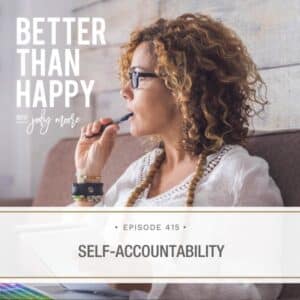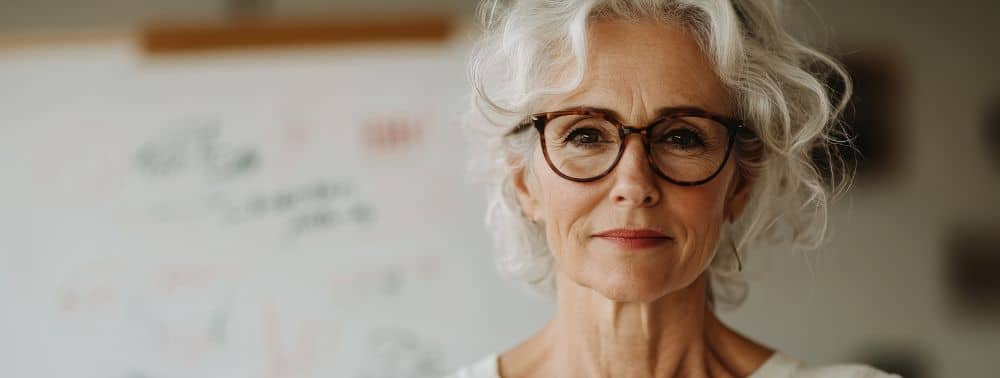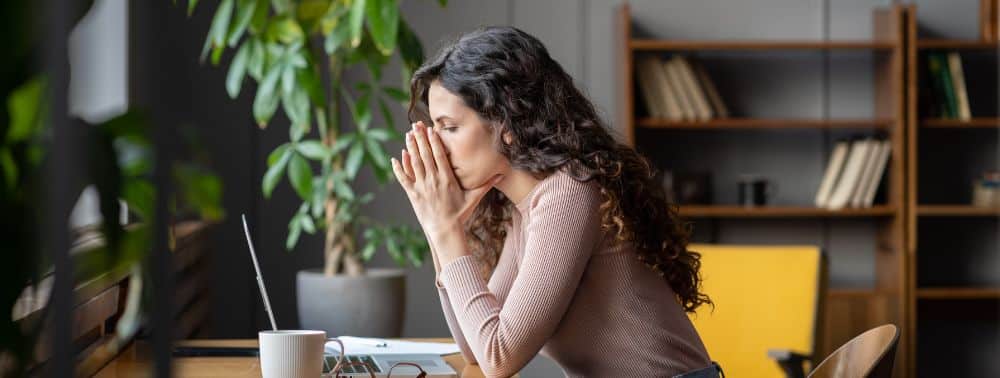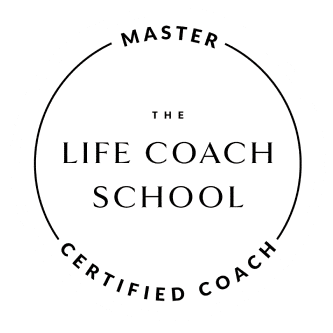Podcast: Play in new window | Download

Have you ever found yourself saying, “I just need someone to hold me accountable?” If you think you’d be able to be more consistent at creating a new habit or working towards a result you want if you had someone to hold you accountable, you’re in the right place.
I’m all for having someone else in your life hold you accountable to your goals. However, imagine what you could create if you were effective at holding yourself accountable. The truth is it’s human nature to be inexperienced at self-accountability, and there are certain things we unwittingly do that prevent us from being able to use this skill.
Tune in this week to hear 6 things that stop us from practicing the skill of self-accountability. I’m outlining each one to show you how they might be showing up in your life, and what you can do to circumvent them to begin strengthening your ability to hold yourself accountable.
Join me for a 3-day virtual workshop called The Art of Happiness, happening Wednesday, July 12th 2023 through to Friday, July 14th 2023. It’s only $19, so click here to register!
What You’ll Learn on this Episode:
- Why developing the skill of self-accountability is important.
- 6 things that prevent us from practicing self-accountability.
- The problem with being broad and vague about your habits.
- Why you’re indulging in confusion and the antidote.
- My tips for practicing intentional consciousness.
- The danger of numbing.
- How you might be denying yourself rewards.
Mentioned on the Show:
- When you’re ready to take what you’re learning on the podcast to the 10X level, then come check out Be Bold.
- If you’re a coach who is already certified through The Life Coach School, I want to help you take your coaching to the next level. Interested? Get on the waitlist here.
- Get on the waitlist for Business Minded here.
- Follow me on Instagram or Facebook!
- Grab the Podcast Roadmap!
- Better Than Happy: Connecting with Divinity through Conscious Thinking by Jody Moore
- Follow my brand new business Instagram account where I’ll be sharing my business tips for all you entrepreneurs!
- Check out this episode on my YouTube channel
I’m Jody Moore and this is Better Than Happy, episode 415, Self-Accountability.
Did you know that you can live a life that’s even better than happy? My name is Jody Moore. I’m a master-certified life coach and a member of the Church of Jesus Christ of Latter-Day Saints. And if you’re willing to go with me I can show you how. Let’s go.
Hey there everybody, how’s it going today? Do you ever find yourself thinking, I just need someone to hold me accountable? I think I could do that thing I’m trying to do. I think I could be more consistent at creating that habit I’m trying to create. I think I could achieve that result I’m trying to achieve if I only had someone to hold me accountable. This is what a lot of coaches do, they’re accountability coaches. They will hold you accountable. You don’t even need a coach to do it. You can get a friend to do it. You can get a family member to do it.
And I’m all for that if you want to have someone else hold you accountable but I also want you to learn the skill of self-accountability because imagine if you were effective at holding yourself accountable. Imagine what you could create in your life. And I’m going to give you six strategies today to try out that will help you to do that.
Before we do, I just want to give you a little update on what’s happening around here. Last, what is today? Today’s Monday as I’m recording this episode, you’ll hear it in a couple of weeks but just a few days ago on Friday we did Be Bold live, which is the in-person event that people in the Be Bold program get to come to. And it’s pretty amazing, if I do say so myself. But it’s not amazing because of me, that’s where I can say that.
It’s amazing because when you get people in a room together who are all interested in personal development and what I love about Be Bold live is we get a lot more men at that event than we tend to get at other events because the membership typically has been more women than men but we let people bring a guest. A lot of times that is a husband that they bring. And the men really respond well to it. We do a lot of coaching at that daylong event with the men there. They become very intrigued. They raise their hands. They ask questions about what’s going on in their lives.
And we coach not just men, the women too but I’m just still reeling from how amazing it was. And just want to thank everybody who came. We had people travel from all over to get there. And then I’m getting ready to leave town again. I’m going to be going to Sacramento area to California to meet with my coaches in my Business Mastermind small group program. We’re going to spend three days together. And that’s always a great powerful experience for all of us as well. So that’s what’s going on for me.
Also we’re just a couple weeks out from The Art of Happiness. And I’m going to be teaching this on Zoom. I will be there live. You will have the opportunity to come and see what coaching is like. And maybe you want to get coached. I hope that some of you do. We will need people to get coached. You’ll have the chance to raise your hand and volunteer.
But even if you’re too shy for that, make sure that you come if you’ve never seen the power of coaching because that’s what we’re going to do there is we’re going to coach and you’re going to see where everything I’m teaching you here on the podcast, gets taken to the next level in a coaching situation. It’s only $19 and you can register at jodymoore.com/trial. We’re even going to tell you at The Art of Happiness how to get your $19 back. So make sure that you’re registered, that you join me for that and/or catch the replays if you can’t be there live.
Okay, so I want to talk about self-accountability today. And I want to frame it. I identified six things that I think are the reasons why we’re not good at self-accountability. So that’s how I’m going to frame the episode. We’re going to go through the six things that prevent self-accountability. And as I talk about them I’m going to talk about how you circumvent that because it is our human nature for most of us to be not very good at self-accountability, at least in certain areas.
I bet there are certain areas of your life where you are good at being accountable to yourself but there are probably others where it’s challenging, that is true for all of us. So I don’t want you to give yourself limiting belief type thoughts like I’m just not good at following through on what I say. I never do what I say I’m going to do. I never finish things. I’m too much of a perfectionist or I’m just too overwhelmed and stressed. I can’t even get started.
All of those kinds of thoughts are going to prevent you from diving in and creating what you want to in your life whether what you’re creating be some kind of outcome or obvious result or maybe it’s just a healthy habit that you’re trying to create for yourself. So let me go through these six things that I identified. And if I left any out, please feel free to reach out to me. I love to get DMs from you guys on Instagram. We can continue this discussion there, but let’s start with the number one, well, these are in no particular order.
So the first thing I want to talk about is that we stay too general. So let’s say I have told myself hey, I’m going to start getting up earlier in the mornings for whatever reason. Maybe I want to have more time to read or journal or exercise or whatever it is. Or I just want quiet time before the kids get up, before I have to go on with my day. I’m going to get up earlier in the morning. The first thing that we do that prevents self-accountability is we get general. We say things like, I never do it or I haven’t done it at all since I said I was going to do that.
Or even if we say, “I do it mostly but not always.” Notice how we are talking in generalizations. We are lumping our behavior into one big broad category. Now, if you’ve been with me for a while and you’ve heard me teach the model then you know what that means is that we’re making the situation, we’re getting into the thought line when it comes to the situation. If I say I mostly am good at getting up early but not always or I never get up early. I said I was going to, I’ve been trying to do this for months or years and then I just never do it.
These are thoughts, these are not facts. And it’s impossible to get facts when we stay that general. We have to get specific to get facts. So last week one day out of seven I got up early like I said I would. Would be a fact. Or in the last five years I’ve gotten up before 6:00am zero times. Might be a fact. Or since two months ago when I told myself I’m going to start getting up early, I have succeeded three times and I have not done it the other however many days, times that would be. You get the number, you get specific.
Or even better, take a specific situation. Yesterday I told myself I was going to get up early, the alarm went off, I hit snooze. I thought to myself I just need more sleep. I’m too tired and I did that four times and then eventually it was whatever time I normally get up and that’s what happened yesterday. Notice how specific we are and how now we’re into the circumstance line. We’re just getting facts. Here’s why this matters. When we are talking to ourselves in these broad generalizations, I never do this, I always do this, I often do this, I seldom do this. It’s really hard to get any leverage and to know where to go next.
It’s like saying to your phone, “Hey, Siri, tell me how to get to Seattle.” And Siri says, “Where are you?” And you’re like, “I’m over on the east side of the state.” She’s going to be like, “It’s hard for me to tell you how to get there without knowing more specifically where you are.” We want to look at specifics. You can look at a specific time when you did or didn’t execute the behavior that you wanted to. It’s not only helpful to look at times when you don’t, it’s helpful to look at times when you did, what was going on that day.
There’s so much to learn from specifics, from broad generalizations we’re in the thought line and as human beings part of our brain’s job is to make our thoughts true. So this is why I want to get specific.
Number two, the second thing that we do that prevents self-accountability is we choose to be confused or we indulge in confusion. So if we start diving in and going, “What happened, why didn’t you get up or why did you get up, what was going on that day when you did get up early?” It’s so tempting to go, “I don’t know.” That is almost always the first reaction or answer that I get from people when I’m coaching on a topic like this. What was going on? Why did you not? Why haven’t you been getting up early? Or why did you on those three days when you did?
And people always say, “I don’t know.” Again, this is the brain’s preference. The brain prefers to be confused and in the dark because it requires the prefrontal. It requires a lot of energy and focus to go in and think about what was going on, what was I thinking, what did I do, why did I do it, what was I worried about, what was I afraid of, what am I hiding from myself or that I think I’m hiding from others, what is really going on? You have to stop and think about it. You have to do some critical thinking.
I feel like in our world we’re getting worse and worse at critical thinking which worries me. I don’t mean critical thinking in the form of criticizing. We’re good at that. I mean thinking critically about a problem, thinking through it in a strategic, thoughtful way. I’m constantly trying to teach my kids this. They’ll come to me with a problem or question and I’ll go, “Let’s use critical thinking to see if we can figure it out. What do you think might be going on? What do you think that means? What do you think is going to happen next? What time do you think we’re going to leave?”
Critical thinking, think through it, think about the future, take the information you know about the past and come up with an educated guess. So critical thinking is the antidote to being confused. So this comes in handy with self-accountability because if I’m trying to get myself to get up early in the mornings. That’s just the example I use. You can apply this to anything obviously. But if I’m trying to get myself to get up earlier and I start taking a look at times when I haven’t or times when I have and asking myself why, then instead of being confused I’ve got to apply critical thinking.
The truth is we do know, we all know, we always know. We just sometimes don’t want to know or we don’t want to stop and think about it. And that is because of some of the other reasons I’m going to talk about here next. So let’s move on to number three.
The third reason we sometimes are not good at self-accountability is because we prefer unconsciousness. Unconsciousness, I don’t mean literally unconscious like in a comatose state or just sleep state. But there’s a difference between paying attention and being conscious of what you’re doing and doing things unconsciously. In other words the lower brain is driving. You’re not really thinking about it. You’re thinking about something else and you’d have to slow down and redirect yourself to think about it. This is the way most of us drive after we’ve been driving for a while.
We don’t really have to think about what does a red light mean and who has the right of way? We can do it somewhat unconsciously and this is how many of us prefer, well, all of us actually, all healthy human beings prefer to operate in unconsciousness as much of the time as possible because it saves us energy. Moving into consciousness requires more energy. We have to focus. We have to again, going back to thinking critically, we have to pay attention. The brain is supposed to avoid that, it’s supposed to because that takes a lot of energy and your brain is supposed to save energy.
So there’s nothing wrong with you but if you choose to be conscious not all the time, you don’t have to be conscious all day about everything. But around whatever habit you’re trying to change or whatever result you’re trying to create in your life, choose at times to sit down and go, “Okay, what happened there?” Again, back to number two, critical thinking and move into consciousness. Now, there are a lot of ways you can help yourself to do this. Some of the ways I like are journaling. You might stop every day and write down what happened today.
Did I get up when I said I would or not, and if not, why not, and if so, why, what was going on? What was I thinking? What helped? What made it easier? What made it harder? What happened leading up to it? What happened afterwards? Paying attention, moving into consciousness, that’s exhausting. And again just do it on occasion.
I’m not even saying you have to do this every day, maybe once a week you sit down and you assess the week and then you take a moment to be conscious, and you take a moment to not be confused, just to own the answer and you get specific. Remember, we’re not going to be general, we’re going to get specific.
Okay, number four, numbing. Numbing ourselves out prevents self-accountability. In other words instead of taking a look at what’s going on and paying attention and writing it down and asking some really useful questions and gaining some useful information to help me going forward, I will just numb out from that instead. I will just get on to social media instead. I will just do some online shopping instead. We literally don’t even take the time.
And this is not unusual. This is the way most people operate in the world, instead of working on improving my life in this slow challenging way I will just give myself a temporary hit of life improvement with a cookie or some pornography or social media or etc. So numbing is a really great way to trick your brain into believing that you have the life you want instead of being willing to do the slow hard work of creating the life that you want. It’s a dangerous world that we live in because numbing is so easy to do.
But if you’re numb to the idea that your life doesn’t look how you want, that your habits aren’t creating what you want, that your health isn’t what you want, that your relationships aren’t what you want, that your money isn’t what you want etc., then you miss out on the part of you that is capable of fixing it, improving it, changing it. So numbing is preventing self-accountability in many, many cases.
Number five, this is probably the main reason, the main reason we are not good at self-accountability is because of shame, shame and/or guilt. Even though I do believe those things are slightly different, I’m just going to lump them together for the purposes of this because shame and guilt will prevent you from holding yourself accountable. If you sit down, what is accountability? If I’m going to hold one of my employees accountable for example, that means I’m going to sit down with them on occasion and we’re going to take a look at how they’re doing with regards to their job performance.
And I’m going to point out all the things that they’re doing well and commend them and thank them and encouraging them to keep doing them. And then I’m going to point out the areas where they may be falling short and we’re going to talk about why. We’re going to talk about whether or not they need more tools or training or support or maybe I wasn’t clear. Maybe I didn’t lay out my expectations clearly and/or maybe they just need to step it up.
And we’re going to have a very loving, ideally, supportive, friendly conversation about that. And I’m going to tell them, “Listen, I value you. I think you’re an amazing asset to this company and I want to see you succeed here. And these are the things that need to happen for you to keep succeeding here and I hope that you choose to do them. And I hope you’ll let me know if you need support and help doing them.” But this isn’t about guilting anyone or shaming anyone, just about getting clear about what’s expected and seeing what’s necessary for that employee to win and succeed.
And maybe they choose not to and they don’t last. And maybe they choose to and they do and then we’re both happy about that, but that’s accountability in the end. So self-accountability then is the same thing, where you sit down with yourself and you say, “Hey, what’s going on? I notice in these areas you’re making great progress and I notice that in all these other areas you are struggling. What’s going on? What do you need? Do you need more support? Do you need more tools? Have I given you an unrealistic goal? Have I set the expectations too high?
Did you know, I believe that you’re capable of this? I know it’s possible for you. I believe in you. Let’s go.” The guilt and the shame that we layer on top of it will prevent you from continuing to assess yourself in this way. It will prevent you from staying conscious. It will prevent you from getting specific if you turn around and make it mean all kinds of terrible things about yourself. It will make you want to just numb instead. It will contribute to all these other things that we just talked about.
It‘s the reason why when I ask people, “Why do you think you didn’t follow through on what you said you said you were going to do?” They say, “I don’t know.” Because if they own the truth, I was afraid, I didn’t feel like it, I preferred to watch Netflix instead or I just wanted to sleep longer or I’m afraid people will judge me etc. If they tell the truth then they’re going to judge themselves for that truth if they’re worried, maybe I’m going to judge them too. I don’t know.
We worry about that, but with self-accountability, if you just choose never to judge yourself, if you decide, listen, I always have a good reason, a valid reason. Even if that valid reason is I’m a human being. I’m afraid. My brain just wants to rinse and repeat. Developing new habits is challenging. Okay, it’s valid, it’s all valid and yet we’re going to do it anyway. So you have to be willing to drop the shame and the guilt. And people ask me how and I tell them, “You just choose not to go down that path.”
You’ll notice, I ate the food I told myself I wasn’t going to eat or I didn’t work on my business the way I said I was going to work on my business. Or I yelled at my kids when I told myself I wasn’t going to yell at my kids. Okay, so what was going on? What was that about for me that day? Why did I choose otherwise? The answer can’t be because there’s anything wrong with you because there’s not. So drop the shame and the guilt, identify the reason. I was tired. I thought that food was going to be the answer to my stress.
Or I didn’t go to bed on time or I thought to myself it’s no big deal whether I get up or not, it doesn’t really matter. Alright, this is just good information. Are you with me? Do you see how we find the information and then we just stop? We don’t go down the path of what’s the matter with you, you’re never going to do it. We go, “Okay, that’s good to know, so now what?” And this brings me to the sixth and final thing that I want to offer to you.
The sixth and final reason that we tend to self-sabotage instead of hold ourselves accountable in a useful way and that is denying rewards. A part of accountability is rewards. It’s not just hey, don’t forget, this is what we expect and you’ve dropped the ball. And it’s not just consequences for not doing things. It’s also rewards. And rewards can be actual tangible things that you do or buy or whatever but they don’t have to be.
Rewards can just be acknowledgement. Do you know what goes a really, really, really long way for human beings? Just a kind acknowledgement. Hey, thanks for doing that. I’m so proud of you. Well done. I knew it was possible. I’m so proud of you for doing it. Why do we give our kids chore charts and things? Because the human brain likes to check off a box or put a sticker or put a star on something and see a tally of wins on paper. And that is not just true for kids. That is true for adults as well.
This is why apps like MyFitnessPal can be so helpful if you’re trying to change your eating habits. It’s not just about tracking your food although it will do that, tracking what food you’re eating and making sure you’re more consciously aware of what you’re eating. But also if you’re trying to hit a certain number at the end of the day, and when you hit that number you get a little reward of look at me winning. That’s a good thing.
Now, again if you’re going to use that same thing then to guilt and shame yourself, now we have a problem. That’s not what I’m talking about. I’m not talking about having a star chart and beating yourself up when you don’t get a star. The star chart is just about reward, it is not about punishment. You can do little things, drop a bead in a jar every time you do it and watch the jar fill up. Check a box on a chart that you make. Sit down and tell yourself, well done me, I’m so proud of you for doing that, thanks for doing that.
Reward yourself with something that doesn’t have any kind of negative back end consequence such as go for a walk. That’s a great reward for me. Giving myself time to play the piano is a reward for me. What are the rewards that are going to serve you in the long run, not just become a numbing escape in the moment.
So let me go through those one more time. There are six things we do that prevents self-accountability. If you can pay attention to these and you don’t have to master all of them but you’ll notice there’s a lot of overlap with all of them. Then I promise you can develop the skill of self-accountability. You can strengthen your ability to hold yourself accountable and I highly recommend that you do.
The first one is we stay too general, so get specific. Number two, we choose to be confused instead of just owning the answer, the truth that we know about what’s going on. Number three is unconsciousness, you’ve got to move into consciousness, do some journaling on occasion, sit down and have a conversation with yourself. Number four is numbing, we numb ourselves out which makes it challenging to keep doing the hard work.
Number five is shame and guilt. You do not need to be ashamed or feel guilty when you’re not succeeding. I promise you, shame and guilt will not get you there long term, they send you the opposite direction. And number six is denying rewards. You’ve got to reward yourself as you go. The ultimate reward will be the new habit or the result that you’re trying to create. But you’ve got to have little, tiny rewards along the way to counteract the hard work that your brain is having to do or it won’t want to stick with it long term.
Alright, self-accountability, that’s what we’re all about around here. Again, if I forgot anything, please send it to my DMs. I’m Jody Moore Coaching on Instagram, Facebook, you can find me there. Alright, have a beautiful rest of your day everyone, take care.
Hey there, if you enjoy this podcast or even if you just find that it sort of piques your curiosity, or it makes you think, you’re going to love the book that I wrote. It’s called Better Than Happy: Connecting with Divinity Through Conscious Thinking. And it’s available now at Amazon in print or kindle version. Or if you want me to read it to you, head over to audible and grab the audio version. And why not grab a copy for your sister, your best friend, or your mom while you’re there too. Just saying.
Enjoy the Show?
- Don’t miss an episode, follow on Spotify, Apple Podcasts, Stitcher, or RSS.
- Leave us a review in Apple Podcasts.








